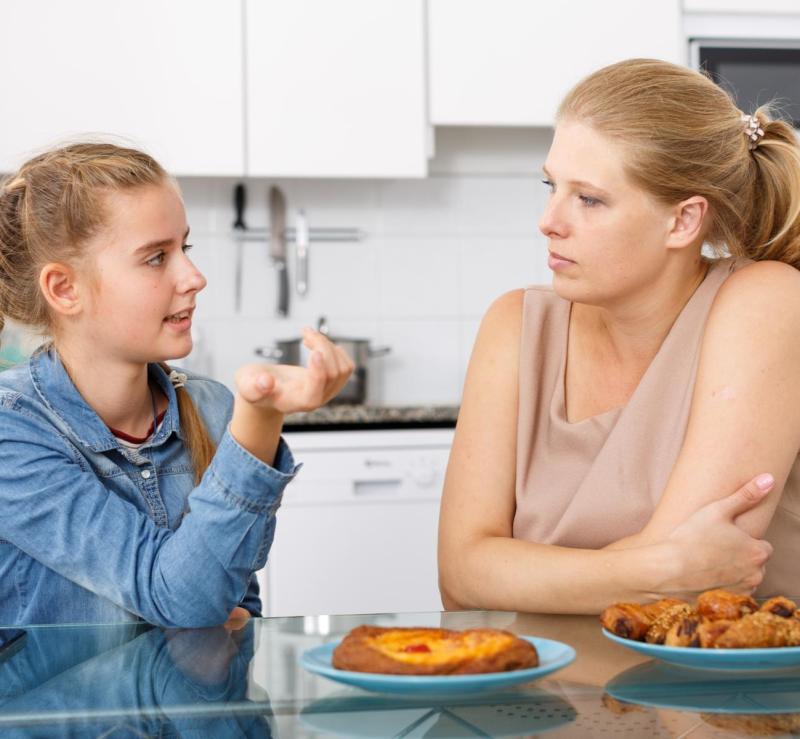 The benefits of discussing puberty with your child include…
The benefits of discussing puberty with your child include…Prevention of sexual abuse through understanding concepts of consent and how to seek help.
Separating fact and fiction and correcting any rumours or false information they have heard from friends or read online.
Reducing the taboo often associated with these topics, helping you to have open and honest conversations with your child as they continue to develop.
Is there anything simple about talking to your child about sexual health? Perhaps not, but endeavour to repeat the question back to your child to clarify what they want to know.
Give a simple, clear and factual answer and check that your child has understood what you have told them by asking them to explain it to you in their own words. Ask them if they would like any other information, or if they have other questions. Don’t be surprised if you have to repeat your answer several times! Remember these concepts are new and may take some time for your child to understand.
More complex questions need a similar approach to simple questions. Start by clarifying the question your child has asked to make sure you understand what it is they want to know. Ask your child what they already know about the topic before answering. This will tell you where to start your answer and inform you as to how much detail to give at this stage. Give your child factual answers and keep the tone of the conversation positive. Be sure to take the opportunity to correct any misinformation. Explain that views on the topic you are discussing may vary and try to set your own boundaries. If you feel something is not right, seek additional help.
Remember that you do not need to be an expert! Don’t be afraid to say, ‘I don’t know!’
This will provide the opportunity for you and your child to find out together. Try to avoid criticising or judging your child and try not to react with anger. Don’t interrupt your child when they are speaking – it is important for their learning journey to articulate their questions and ideas.
If you feel uncomfortable, admit it to your child. It’s better to experience a little discomfort than to avoid the topic entirely. Your child will probably be grateful they are not the only ones feeling uncomfortable!
Other topics to consider
The Talk About It sexual health education module that Life Ed QLD teaches in schools encourages children to communicate with safe adults about personal development. Here are some additional topics that you may want to consider discussing with your child in future:
As a parent, you’ve probably heard discussions about ‘consent’, but you may not know what it entails or how to introduce the topic to your child.
Although we often think of consent in terms of intimate sexual relationships, consent can apply to other situations as well and is an important concept for children to learn about from an early age. Understanding consent can lead to better relationships with family, friends, peers and eventually, romantic partners.
In this podcast, Let’s Talk About Consent, we investigate how to introduce consent concepts with younger children.
Author of Welcome to Consent and practising physician Dr Melissa Kang says the conversation begins with giving children an understanding of their personal space and boundaries, as well as helping them to understand and identify the boundaries of others.
Few people know as much about the cyber world as Brett Lee.
As a former detective specialising in child exploitation, Brett spent countless hours investigating child sex offenders, posing as a teenager so he could prosecute scores of predators who preyed on children.
After working on high-profile cases handled by the Department of Homeland Security, the FBI, and the Australian Police Force, in 2001, Brett decided to utilise his experience to educate people on how to avoid the pitfalls of the online world. He founded Internet Safe Education, and has reached thousands of students, teachers, and parents, spreading the message of online awareness and responsibility.
In this podcast for Life Education Queensland, Brett offers some incredible insight into how predators identify and groom their child targets and shares the key things parents can do to keep kids safe online. He says, from the outset, all children need to understand the value of their identity on the internet and grasp how it connects them to the wider world, and potentially, millions of other users.
You can access additional information and resources to support you and your child during this important time.
Cybersafety
Personal Safety